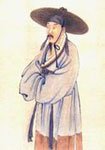“赖有酒美犹能狂”的意思及全诗出处和翻译赏析
诗词类型:
《醉後草书歌诗戏作》陆游 翻译、赏析和诗意
《醉後草书歌诗戏作》是宋代陆游创作的一首诗词。以下是这首诗词的中文译文、诗意和赏析:
朱楼矫首隘八荒,
红楼高耸,俯瞰八方荒凉,
Translation: The vermilion tower stands tall, overlooking the desolation of all directions.
绿酒一举累百觞,
绿色的酒一举杯,已经喝了百杯,
Translation: With a single toast of green wine, a hundred cups have been consumed.
洗我堆阜峥嵘之胸次,
洗涤我那高耸峻峭的胸怀,
Translation: Cleansing my lofty and resolute spirit,
写为淋漓放纵之词章。
写成了奔放自如的诗章。
Translation: Composing a poem that is unrestrained and vivid.
墨翻初若鬼神怒,
墨水翻涌,仿佛鬼神的怒火,
Translation: The ink surges, as if the anger of ghosts and gods,
字瘦忽作蛟螭僵;
字迹瘦弱,突然变成了僵硬的蛟螭;
Translation: The characters become thin and rigid like a dragon.
宝刀出匣挥雪刃,
宝剑从剑鞘中抽出,挥舞着雪亮的刀锋,
Translation: The precious sword is unsheathed, wielding a gleaming blade,
大舸破浪驰风樯。
巨船破浪前行,迎风扬帆。
Translation: The large ship breaks through the waves, sailing with the wind.
纸穷掷笔霹雳响,
纸张用尽,扔下笔,发出霹雳般的声响,
Translation: The paper is exhausted, the pen is thrown, making a thunderous sound,
妇女惊走儿童藏。
妇女们惊慌逃跑,孩子们躲藏起来。
Translation: Women are startled and flee, while children hide.
往时草檄喻西域,
过去的时光,用草书传递消息,比喻西域,
Translation: In the past, grass-script proclamations conveyed messages, metaphorically referring to the Western Regions,
飒飒声动中书堂。
飒飒的声音在中书堂中回荡。
Translation: The sound echoes in the study hall.
一收朝迹忽十载,
一收拾朝廷的痕迹,转眼已过去十年,
Translation: Gathering the traces of the court, ten years have passed in the blink of an eye,
西掠三巴穷夜郎。
向西征服三巴,到达贫瘠的夜郎,
Translation: Conquering the Three Gorges in the west, reaching the desolate land of Yelang.
山川荒绝风俗异,
山川荒凉,风俗奇异,
Translation: The mountains and rivers are desolate, the customs are peculiar,
赖有酒美犹能狂,
幸好有美酒,依然能够狂放不羁,
Translation: Fortunately, with fine wine, one can still be wild and unrestrained,
醉中自脱头上帻,
醉酒之中,自己脱下头上的帽子,
Translation: In drunkenness, removing the hat from one's head,
绿发未许侵微霜。
青春未允许白发侵袭。
Translation: Youth is not yet allowed to be invaded by gray hair.
人生得丧良细事,
人生中失去的是些微小的事情,
Translation: In life, what is lost are trivial matters,
孰谓老大多悲伤!
谁说老去只有悲伤!
Translation: Who says that old age is only filled with sorrow!
这首诗词以豪放的笔触描绘了作者醉后的情景和心境。作者借酒释放内心的狂放和豪情,表达了对世事变迁的感慨和对人生的思考。诗中运用了丰富的意象和比喻,展现了作者的才情和豪情壮志。整首诗词以自由奔放的语言和形象,表达了作者对人生的积极态度和对自由的追求。
《醉後草书歌诗戏作》陆游 拼音读音参考
zuì hòu cǎo shū gē shī xì zuò
醉後草书歌诗戏作
zhū lóu jiǎo shǒu ài bā huāng, lǜ jiǔ yī jǔ lèi bǎi shāng, xǐ wǒ duī fù zhēng róng zhī xiōng cì, xiě wèi lín lí fàng zòng zhī cí zhāng.
朱楼矫首隘八荒,绿酒一举累百觞,洗我堆阜峥嵘之胸次,写为淋漓放纵之词章。
mò fān chū ruò guǐ shén nù, zì shòu hū zuò jiāo chī jiāng bǎo dāo chū xiá huī xuě rèn, dà gě pò làng chí fēng qiáng.
墨翻初若鬼神怒,字瘦忽作蛟螭僵;宝刀出匣挥雪刃,大舸破浪驰风樯。
zhǐ qióng zhì bǐ pī lì xiǎng, fù nǚ jīng zǒu ér tóng cáng.
纸穷掷笔霹雳响,妇女惊走儿童藏。
wǎng shí cǎo xí yù xī yù, sà sà shēng dòng zhōng shū táng.
往时草檄喻西域,飒飒声动中书堂。
yī shōu cháo jī hū shí zài, xī lüè sān bā qióng yè láng.
一收朝迹忽十载,西掠三巴穷夜郎。
shān chuān huāng jué fēng sú yì, lài yǒu jiǔ měi yóu néng kuáng, zuì zhōng zì tuō tóu shàng zé, lǜ fā wèi xǔ qīn wēi shuāng.
山川荒绝风俗异,赖有酒美犹能狂,醉中自脱头上帻,绿发未许侵微霜。
rén shēng de sàng liáng xì shì, shú wèi lǎo dà duō bēi shāng!
人生得丧良细事,孰谓老大多悲伤!
“赖有酒美犹能狂”平仄韵脚
拼音:lài yǒu jiǔ měi yóu néng kuáng
平仄:仄仄仄仄平平平
韵脚:(平韵) 下平七阳
